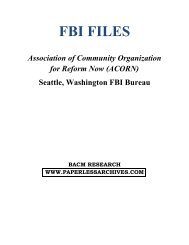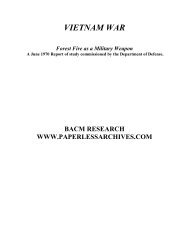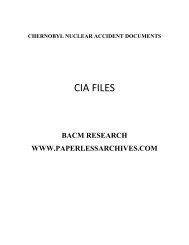national security agency journal articles world war ii german ...
national security agency journal articles world war ii german ...
national security agency journal articles world war ii german ...
You also want an ePaper? Increase the reach of your titles
YUMPU automatically turns print PDFs into web optimized ePapers that Google loves.
UNCLASSIFIED<br />
ployed more than 100 people, whereas Foreign Armies<br />
East had, at its peak, several times that many.<br />
Foreign Armies West, not equipped to deal with<br />
economic matters, gave these only secondary treatment,<br />
and relied, to all practical purposes,on the<br />
efforts and results of the Field Economic Office (Feldwirtschaftsamt)<br />
in the OKW. Foreign Armies East<br />
paid increasing attention to the questions of the<br />
Russian industrial and armament potential, and organized<br />
Subsection IT for that purpose. Foreign Armies<br />
East even joined efforts with the Field Economics<br />
Office by taking as chief of Subsection II an officer<br />
who was also a specialist on Russia in the Field<br />
Economic Office, so that the work of both agencies<br />
was properly coordinated, and each office could utilize<br />
directly the facilities of the other for carrying out its<br />
work.<br />
Through Gehlen's outstanding personality, Branch<br />
Foreign Armies East gained direct influence over<br />
agencies whose efficient functioning was important to<br />
its success. The tactical employment of agents came<br />
directly under the branch, which was able to direct<br />
short-range secret intelligence in accordance with its<br />
day-to-day needs. In the West, there was no such<br />
simple chain of command, and the intellignece reconnaissance<br />
units did not do nearly so well.<br />
Such were the main reasons for the noticeable<br />
difference in efficiency between Foreign Armies East<br />
and West. Because of outstanding leadership, Foreign<br />
Armies East received all the support and cooperation<br />
it needed in order to increase its intelligence effort<br />
according to the needs of the German Army. Foreign<br />
Armies West, lacking such support, remained a small<br />
<strong>agency</strong> too busy with the day-to-day technical details<br />
of work to develop into the large central intelligence<br />
<strong>agency</strong> which the Germans needed for their great fight<br />
in the West. In neither case, however, while the<br />
Army's and the High Command's attitude to<strong>war</strong>d<br />
intelligence remained what it was, could these agencies<br />
carry out their mission adequately.<br />
Conclusion<br />
The results of this study are largely negative. It<br />
shows that the German approach to intelligence was<br />
a faulty one: insufficient attention was given to the<br />
subject as a whole, its importance was generally<br />
underrated, and the intelligence officer was rarely able<br />
to attain the prestige necessary for his job. For the<br />
first three years of the <strong>war</strong>, this had but little adverse<br />
effect on operations, but later the very success at arms<br />
which the Germans had enjoyed served only to increase<br />
their neglect of intelligence, so that, as the tide<br />
turned, they were unable to estimate correctly the<br />
extent of allied superiority. It would be untrue to infer<br />
from this that German intelligence was bad. Perhaps<br />
it would be more precise to call it "mediocre", and to<br />
say that its disadvantages were largely offset by the<br />
high military efficiency of the Germany Army as a<br />
whole.<br />
Because there is little that the Allied intelligence<br />
services can learn from the Germans, no attempt has<br />
been made in this study to collect every possible detail<br />
of German methods and their results. These have been<br />
merely outlined and only those aspects from which a<br />
lesson could be learned have been considered and<br />
emphasized. Some of the different methods used by<br />
the Germans point a moral, as in the case of their<br />
concentration on signal intelligence, their emphasis on<br />
low rather than high-grade ciphers, and their disregard<br />
for <strong>security</strong> in the dissemination of results. In other<br />
procedures, they stressed detail to an extent which we<br />
might well follow. Apart from these points, this general<br />
discussion of German methods can have at least the<br />
negative value to Allied intelligence of lessons in<br />
weaknesses.<br />
22 UNCLASSIFIED
















